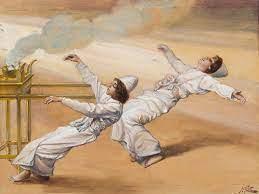The Judgment and Mercy of ADONAI
10: 1-20
History tells us again and again of people who had auspicious beginnings filled with promise and yet who, in an unguarded moment, suddenly fell. The nature of their errors might seem relatively mild at first glance: a leader loses his temper and strikes the rock instead of speaking to it (Num 20:9-13); sinful hands touch the holy things of God’s sanctuary (2 Sam 6:6-8); unauthorized fire is burned in the holy place (Lev 10:1). These events might seem small in our estimation – but this is not God’s estimation, for their error turns what was a place of salvation into a place of judgment. Many calamities have fallen on the house of the LORD in the shape of apostasies, false doctrines, unholy living, and reckless rebellion. Leviticus 10 is the report of such a mistake.

On their graduation day, the first day on the job, Aaron’s two sons, Nadab and Abihu, brought strange fire into the Holy Place in their censers – something that ADONAI had not commanded them to do. Immediately, the fire of Ha’Shem destroyed them for their disobedience. The divine judgment was swift and final. It had to be so because their violation of the Sanctuary and the priesthood came at the very beginning of the Israelites ability to draw near to ADONAI. Without such an immediate response, the corruption of the offerings would have been rapid and perhaps unstoppable. And yet the priesthood survived this judgment; it did not come to an end because of their disobedience, as the aftermath of the episode showed. On the contrary, these verses turn out to be a confirmation of Aaron’s high priesthood and a reinforcement of his duties.141 Therefore, despite such a negative beginning, Leviticus 10 does end positively. This chapter is divided into two sections: The Death of Nadab and Abihu – 10:1-11 (to see link click Bh), and The Mercy Shown to Eleazar and Ithamar – 10:12-20 (Bi). The Torah displays both judgment and mercy.



Leave A Comment